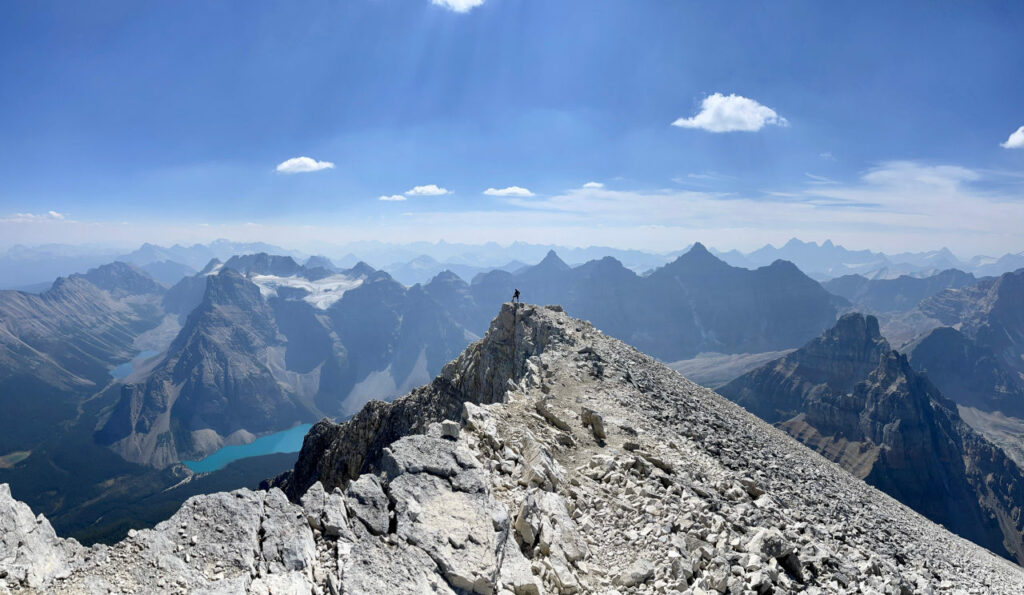Have you ever had a moment so extraordinary, so filled with wonder and insight, that it seemed to lift you beyond your ordinary reality?
These experiences of wonder, insight and interconnectedness are called peak experiences. These profound moments can arrive unexpectedly – perhaps while watching a sunset paint impossible colors across the sky, or during the birth of a child, or in a moment of perfect connection with another person.
Time can seem to stop or expand, and you might feel a deep sense of unity with everything around you. The boundaries between you and the world might momentarily dissolve, leaving you with a profound sense of meaning, truth, or transcendence.
While these experiences are deeply personal and unique to each individual, they often share common threads of awe, clarity and a feeling of touching or being apart of something larger than ourselves.
Abraham Maslow And Peak Experiences
After the chaos and destruction of World War II, Western psychology became obsessed with neurosis, mental illness and medicating people to make them more “normal.”
However, a pioneering American psychologist named Abraham Maslow (1908 – 1970) thought that psychology focused too much on neuroticism and bland ideas of normality that made people conform to the values and ideals of capitalism and mass consumer society.
Instead, he chose to focus his research on how to make people extraordinary by focusing on the mindset, habits and routines of highly successful leaders, entrepreneurs and creative people. He sought to create a blueprint or a map for people to live extraordinary lives and become what he called self-actualizing individuals.
Today, Abraham Maslow is best known for his Hierarchy of Needs, a theory of psychological health predicated on fulfilling innate human needs in priority, culminating in what he called creative “self-actualization.”
He also popularized the notion of peak experiences by focusing his research on mentally healthy people who were able to self-actualize (essentially be the best that they could be by reaching their full potential).
In his research conducting interviews with thousands of extraordinary people, he found that many of these people reported having transcendental experiences that were fundamental in shaping their outlook on life.
These transformational peak experiences were described by Maslow as “powerful, meaningful experiences in which individuals seem to transcend the self, be at one with the world, and feel completely self-fulfilled.”
They are very similar to the flow experiences later described in research by American psychologist Mihaly Csikszentmihalyi, which involve a state of total absorption and complete involvement in an activity.
In fact, much of Csikszentmihalyi’s groundbreaking flow psychology research is built upon Maslow’s ideas about self-actualization, positive psychology and peak experiences.
Why Abraham Maslow Created Positive Psychology:
“Expression and communication in the peak–experiences tend often to become poetic, mythical, and rhapsodic as if this were the natural kind of language to express such states of being.”
— Abraham Maslow
In the 1950s, Maslow began to develop his ideas around human motivation and the healthy development of strong character and personalities, which ran contrary to the dominant Freudian movement, which preferred to focus on the dysfunctions and neuroticism tendencies of the human mind.
He initially called this new discipline based on studying the flourishing of human personality and motivation humanistic psychology. He envisioned the cultivation of a new kind of creative individual and a personal development revolution in society toward helping people develop their creative gifts and actualize their full potential.
Maslow believed that education should focus on holistic self-discovery and the meaningful pursuit of passion and creativity; rather than the factory-style rote learning model that had become dominant early in the 20th century to prepare people to work in standardized jobs in factories and bureaucracies.
While Freudian psychology took a view of human nature as being driven by unconscious and destructive urges that had to be controlled, Maslow argued that in the right environment and with a more holistic education focused on healthy self-identity and personality development, young people would develop strong character and orient themselves toward solving meaningful problems and serving their community.
From his research, he found that many of the most creative individuals with strong personalities who could think and act confidently beyond the constraints of their cultural indoctrination and government schooling had been fundamentally shaped by what he called peak experiences.
These peak states of consciousness had transformed their perception of themselves and given them a sense of meaning and purpose that helped motivate them to pursue a meaningful creative life of their own design.
The scientific study of the mindset, habits, personalities and mental states of these creative people would become the foundation for what Maslow would later call positive psychology.
The 3 Characteristics of Transformational Peak Experiences:
“The self expands through acts of self-forgetfulness.”
— Mihaly Csikszentmihalyi

A definitive psychological questionnaire to assess a person’s tendency to have peak experiences was developed by EW Mathes in 1982 called The Peak Experiences Scale.
He identified these 3 key characteristics of peak experiences:
1. Fulfillment:
There is a strong sense of positive emotions, and a deep sense of fulfillment and the experience is intrinsically rewarding.
2. Significance:
The person experiences an increase in self-awareness and understanding, which often serves as a turning point in their life.
3. Spiritual:
There is an intense feeling of unity and connectedness with something greater than the self that can provoke strong feelings of awe, wonder and reverence.
The 16 Aspects of Transformational Peak Experiences:
“The emotional reaction in the peak experience has a special flavour of wonder, of awe, of reverence, of humility and surrender before the experience as before something great”.
— Abraham Maslow

Maslow took a holistic view of peak experiences.
Individuals would have these transformational life-changing experiences and inspired by their experience they would also begin to integrate some of the aspects of these peaks states into the daily experience of their lives.
Maslow found that many high achievers who had a strong sense of purpose and fulfillment could point to these kinds of once-in-a-lifetime peak experiences that shifted their way of thinking. However, it was in their personal development activities that grew out of these peak states where they began to experience these aspects, outlined below, regularly as they became more self-actualized.
He found that peak experiences can range on a spectrum from simple activities to intense transformational events. His research suggested common triggers for peak experiences include art, nature, sex, creative work, music, psychedelics, religious celebration, and scientific discovery.
Here are the key aspects of peak experiences documented in Abraham Maslow’s research and outlined in his book Toward A Psychology of Being:
1. Sense of Unity of The Self
You feel that you are complete and perfect as you are in the moment.
2. Oneness With The Environment
You feel a sense of unity, connectedness and deep embodiment.
3. Experience of Peak Power
You feel a sense of exhilaration that you can do anything anything.
4. Sense of Unity of The Self
Your moment-to-moment experience flows along effortlessly like a river.
5. Self Determination
A feeling of autonomy and being in control without having to think or analyze your actions.
6. Free of Inhibition
Ideas, impulses and insight flow freely without the usual filtering by the analytical mind.
7. Spontaneity
You feel the unrestricted and effortless spontaneity of a child at play.
8. Purposeless Creativity
Creative ideas flow without a specific problem, outcome or direction for them.
9. Timelessness
Time can speed up or slow down and you lose track of time.
10. Pinnacle of Individuality
You feel a sense of wholeness and completeness that is usually lacking in life.
11. Merging of I and Other
You feel a deep sense of empathy and connectedness with other living beings.
12. Unmotivated by Needs
Your basic needs such as food, sleep and shelter are temporarily transcended.
13. Artistic Expression
You enter a stream of consciousness creative flow where ideas come naturally.
14. Sense of Completion
You feel satisfaction and fulfillment in a way that is deep and transformative.
15. Playfulness
You have a childlike impulse to play feeling joyful and effortlessly creative.
16. Surprise Happenings
There is a sense of surprise and not knowing or thinking about what happens next.
Many of these aspects of peak experience can be cultivated through daily rituals and embodied mindfulness practices that incorporate nonduality.
If you want to explore some sensory immersion meditation practices for experiencing self-transcendence, download my guide to The Art And Science of Peak Experiences.
- 10 Sustainable Travel Trends Driving The Future of Tourism - March 9, 2025
- 10 Tips To Sell Out Your Transformational Retreats In 2025 - February 20, 2025
- Build 10 Habits That Free Up Your Time With Mindful Coaching - February 11, 2025





